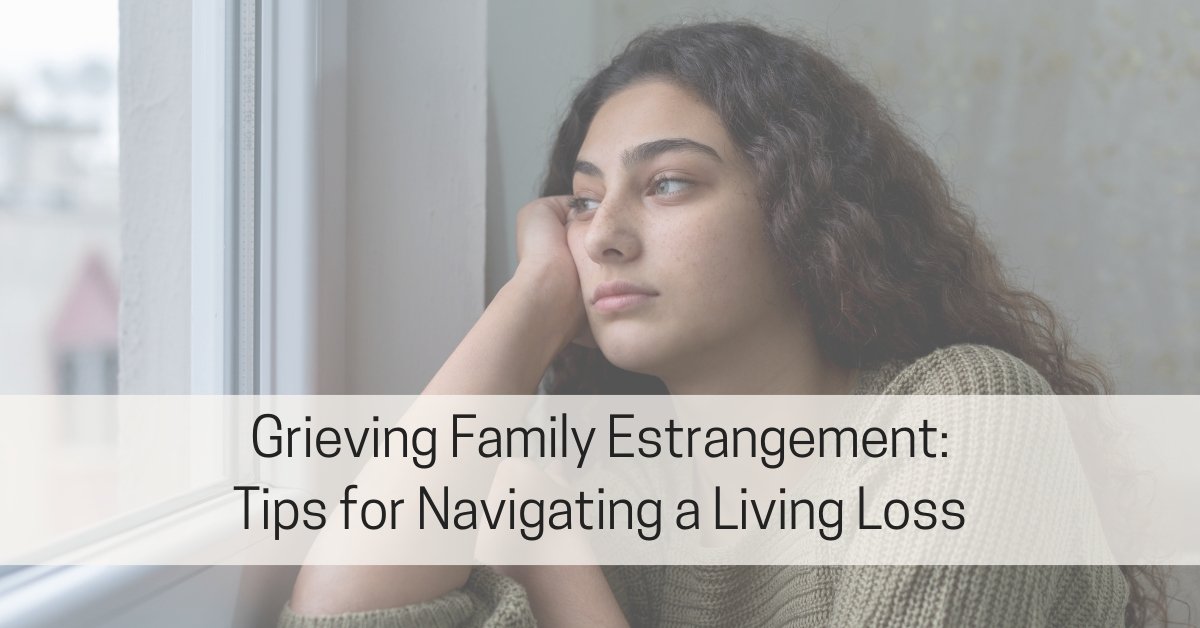Key Takeaways:
- Family estrangement is a form of living loss.
- Grieving family estrangement is complex and painful because of it’s ambiguous and stigmatized nature.
- Grieving the loss of your family will help you heal and move forward.
This post contains an affiliate link, which means we may earn a small commission if you make a purchase through our links. There is no added cost for you.
We often associate grief with death. However, we can also experience grief when significant changes occur in our relationships with living people. This type of loss, known as a living loss, comes with unique challenges and emotional complexities—especially when society fails to understand or validate it.
This is often the case for adult children who make the difficult decision to sever ties with a toxic, abusive, or dysfunctional family.
What Is Living Loss?
Living loss occurs when someone who remains physically present in the world is no longer part of your life in a meaningful way. In the case of family estrangement, the connection you once had—or hoped to have—is gone. Unlike the grief associated with death, living loss is ongoing, ambiguous, and often misunderstood. You may grieve not only the relationship but also the idea of the family you wished for.
Why Grieving Family Estrangement Is So Difficult
As I explain in my book Cutting Ties with Your Parents, grieving family estrangement is exceptionally challenging for a number of reasons, including the following.
- Ambiguous Loss: Unlike death, where there is a clear endpoint, estrangement leaves room for uncertainty. You may wonder whether you made the right choice or whether you’ll ever see your estranged family member again.
- Social Stigma: Society places a high value on family bonds, often reinforcing the idea that family relationships should be preserved at all costs. As a result, friends and family (and society at large) may blame you and judge you unfairly for cutting ties. This can leave you isolated and alone in your grief.
- Guilt and Shame: Most adult children experience high levels of guilt and shame because they’ve been conditioned to believe that going no contact makes them bad, selfish, or mean.
- Layers of Loss: Severing ties doesn’t just mean the end of a relationship with a single person. Often, it results in the loss of additional relationships as family members take sides and align themselves with abusive and family members. There are also many intangible losses, such as the loss of family history, people to spend holidays with, or a safety net.
- Ongoing Triggers: We’re bombarded with images of happy families and messages about the importance of family ties. And birthdays, holidays, and special occasions, like weddings and new babies, can trigger grief, making it feel as though the loss is fresh each time.
- Loss of Identity: Estranging from family often means redefining your sense of self. You might grieve the role you once played or struggle to navigate life without the support you expected from family.
How to Grieve Family Estrangement
Grieving a living loss like family estrangement is a personal process and there’s no one right or wrong way to do it. I offer these suggestions to help you get started.
- Name the Loss: Clearly identify what you are grieving. Is it the absence of connection, the loss of shared memories, or the dream of a loving family? Naming your loss can bring clarity and help you process your emotions.
- Validate Your Feelings: Let yourself feel all the emotions (sadness, anger, relief, fear, guilt, uncertainty, etc.) that come with estrangement. Acknowledge that your feelings are valid and it’s okay to have them, even if others don’t understand.
- Let Yourself Grieve: It’s healthy to mourn the loss of the family you had and the family you hoped for. Explore different ways to express your feelings. Some people find it helpful to journal, meditate, write a goodbye letter (for your own processing, not to send), or express themselves through art or music.
- Seek Support: Connecting with others who understand what it’s like to be estranged from family is an important part of healing and can reduce feelings of isolation and shame. This might include talking to a therapist, joining a peer support group for estranged individuals or a 12-step group such as Adult Children of Alcoholics and Dysfunctional Families, or informally connecting with others who support your decision.
- Maintain Firm Boundaries: It’s crucial to maintain firm boundaries because estranged family members may attempt to contact you, perhaps to reconcile or, more likely, to harass or manipulate you. These attempts can be emotionally draining and disrupt your healing process. By setting and enforcing strong boundaries, you can protect yourself physically and mentally.
- Create New Traditions: Holidays and milestones can be painful reminders of what’s been lost. Create new traditions that bring you joy and reflect your values. Read more about coping with holidays when you’re estranged from family.
- Focus on What You Can Control: While you can’t change the past or how others feel, you can focus on your own growth, healing, and creating a fulfilling life.
- Practice Self-Compassion: Be kind to yourself. It’s normal to have conflicting emotions about estrangement. Remind yourself that choosing your well-being is an act of courage, not failure.
- Redefine Family: Family doesn’t have to mean biological ties. Build connections with people who uplift, respect, and support you. Over time, you may develop close relationships with a “chosen family” or friends who are like family.
If you’re taking space or estranged from a parent, sign up for free supportive resources.
Moving Forward After Cutting Ties
Estranging from family can be one of the hardest and most painful decisions you’ll ever make. Grieving this loss is crucial, even if others don’t understand. Allowing yourself to feel your emotions without judgment can help you process the complexities of your situation and make peace with your decision. With continued effort, grieving will allow you to heal and make space for a fulfilling life and healthier relationships.
©2025 Dr. Sharon Martin, LCSW. All rights reserved. Photos courtesy of Canva.com.
“For anyone realizing that their path to healing might require creating distance from parents who’ve caused harm – you’re not alone. This workbook offers both compass and companion for that complex journey.” – Annie Wright, LMFT
Learn More
This site is for informational purposes only. It provides general information and is not intended to nor should it be used to diagnose or treat any psychological, relationship, or medical issues or advise you on your particular issues, questions, or decisions. You are solely responsible for how you use the information provided on this website and the consequences of your actions. This page may contain affiliate links which means I receive a small commission on items purchased.
Publisher: Source link






